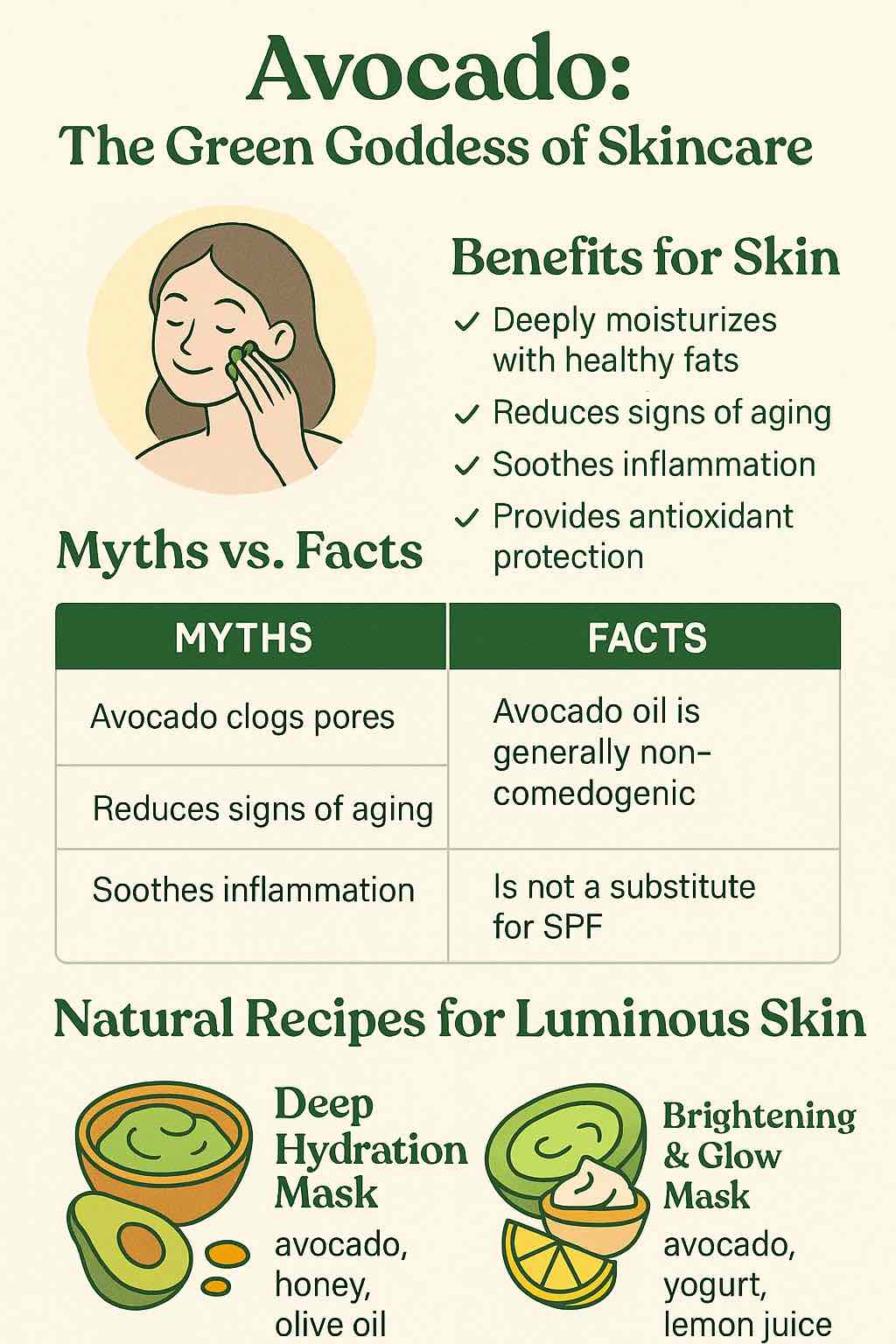
There are few fruits that have earned such reverence in both the culinary and skincare world as the mighty avocado. Known for its creamy texture and rich nutritional profile, avocado has long been hailed as a superfood. But beyond your morning toast or smoothie bowl, this “green goddess” offers transformative benefits for your skin, both from the inside out and topically.
This post dives deep into the latest research, debunks common myths, and offers five practical, dermatologist-informed DIY recipes you can use today to experience the luminous, supple skin that avocado can help achieve.
🌿 The Science of Avocado in Skincare
1. Nutritional Powerhouse for Skin Health
Avocados are packed with:
- Oleic Acid (Omega-9): Deeply hydrating, supports skin barrier
- Linoleic Acid (Omega-6): Helps regulate sebum and reduce inflammation
- Vitamin E: A potent antioxidant that combats oxidative stress
- Vitamin C: Boosts collagen production and brightens skin tone
- Phytosterols & Carotenoids: Natural anti-inflammatory and UV-protective compounds
- Lecithin: Improves absorption of nutrients into the skin
These components combine to nourish, hydrate, and protect the skin from damage and aging.
2. What Does the Research Say?
Recent clinical and animal studies confirm:
- Increased skin elasticity: A 2022 trial found that women who consumed one avocado daily for eight weeks experienced firmer, more elastic skin.
- Wound healing & inflammation reduction: Topical application of avocado oil accelerated wound closure and decreased inflammation in animal models.
- Antioxidant protection: Avocado oil neutralizes reactive oxygen species (ROS) that lead to premature aging.
Researchers suggest avocado’s unique lipid profile and antioxidants work synergistically to support skin renewal, especially when used regularly.
🚨 Avocado Myths: What You Need to Know
Myth 1: “Avocado Oil Clogs Pores”
Truth: Pure, cold-pressed avocado oil is mildly comedogenic (rating ~2). For most people, it does not clog pores, especially when used in moderation.
Myth 2: “Avocado Can Replace Sunscreen”
Truth: While avocado contains UV-protective compounds, it is not a substitute for broad-spectrum SPF. Use it as a complement, not a replacement.
Myth 3: “Only the Pulp is Useful”
Truth: The seed and peel contain bioactive compounds that show antioxidant and anti-inflammatory activity. Seed extracts are emerging in anti-aging formulations.
Myth 4: “It’s Just a Trend”
Truth: Indigenous and Ayurvedic traditions have used avocado pulp and oil for centuries to treat dry skin, sunburn, and wounds.
🥞 5 Avocado-Based DIY Skincare Recipes
💧 1. Deep Hydration Mask (Dry, Flaky Skin)
Ingredients:
- 1/2 ripe avocado (mashed)
- 1 tablespoon raw honey
- 1 teaspoon olive oil How to Use: Mix well and apply to clean skin for 15-20 minutes. Rinse with lukewarm water.
✨ 2. Brightening Mask (Pigmentation & Dullness)
Ingredients:
- 1/2 ripe avocado
- 1 tablespoon plain yogurt
- 1 teaspoon lemon juice (optional; patch test first) How to Use: Blend ingredients, apply for 10-15 minutes. Rinse thoroughly.
🔥 3. Soothing Anti-Inflammatory Mask (Redness & Sensitivity)
Ingredients:
- 1/2 ripe avocado
- 1 tablespoon aloe vera gel
- 1 teaspoon ground oatmeal How to Use: Mix and apply for 15 minutes. Rinse with cool water.
🔍 4. Acne Control Spot Treatment
Ingredients:
- 1 teaspoon avocado oil
- 1 drop tea tree essential oil How to Use: Dab gently on blemishes at night. Wash off in the morning.
👶 5. Anti-Aging Overnight Balm
Ingredients:
- 1 teaspoon avocado oil
- 2 drops rosehip oil
- 1 capsule Vitamin E (punctured) How to Use: Apply a light layer before bed. Wake up to glowing, plump skin.
⚠️ Usage Tips & Patch Test Guide
- Always use fresh avocado to prevent bacterial contamination.
- Store avocado oil in a cool, dark place to prevent rancidity.
- Patch test any new recipe on your wrist or jawline.
- If you have a latex allergy, consult your dermatologist before using avocado-based products.
📈 Final Thoughts
Avocado is more than a health food—it’s a holistic skincare ally backed by tradition and modern science. From its barrier-restoring oils to its antioxidant-rich extracts, this fruit nourishes your skin deeply and sustainably.
Whether you’re looking to restore radiance, calm irritation, or reduce signs of aging, avocado offers a versatile, natural solution. And with the DIY recipes above, you can bring the magic of the green goddess into your skincare routine today.
Glowing skin is only an avocado away.
🔍 Frequently Asked Questions (FAQs)
- Can I use avocado on my face every day?
Yes, you can use avocado-based skincare daily, especially avocado oil. For masks with active ingredients (like lemon juice or tea tree oil), limit to 2–3 times per week to avoid irritation. - Is avocado oil good for oily or acne-prone skin?
Avocado oil is mildly comedogenic (rating 2) but rich in linoleic acid, which can help balance sebum in oily/acne-prone skin. Always patch test and avoid overuse if you’re breakout-prone. - What type of avocado oil is best for skincare?
Look for cold-pressed, unrefined, organic avocado oil. It retains more nutrients and is free from chemical processing. - Can avocado help with dark spots or hyperpigmentation?
Yes, avocado contains vitamin C and E which can brighten the skin and fade dark spots over time, especially when paired with ingredients like lemon or yogurt. - How long does it take to see results from avocado skincare?
Visible improvements—like smoother texture or reduced dryness—can occur within a week. Collagen and elasticity improvements take several weeks with consistent use (4–8 weeks). - Are avocado masks suitable for sensitive skin?
Absolutely. Avocado is naturally soothing. Just avoid recipes with lemon juice or essential oils unless you’ve patch-tested them, as these can trigger irritation. - Can I store leftover avocado masks?
No. Fresh avocado oxidizes quickly and can grow bacteria. Always make and use the mask fresh. If needed, store for no more than 24 hours in the fridge in an airtight container. - Is there a difference between eating avocado and applying it topically?
Yes. Eating avocado supports skin from within (collagen, elasticity, hydration), while topical use hydrates, soothes, and protects the outer skin barrier. Best results come from combining both. - Can avocado reduce wrinkles and fine lines?
Yes, it’s rich in antioxidants (like vitamin E and lutein) and fatty acids that reduce oxidative stress and support collagen. Avocado oil-based night treatments can improve skin texture over time. - Is it safe to use avocado-based products around the eyes?
Avocado oil is generally safe for the eye area due to its mildness, but avoid direct contact with eyes. A tiny amount under the eyes at night can help with hydration and fine lines.










